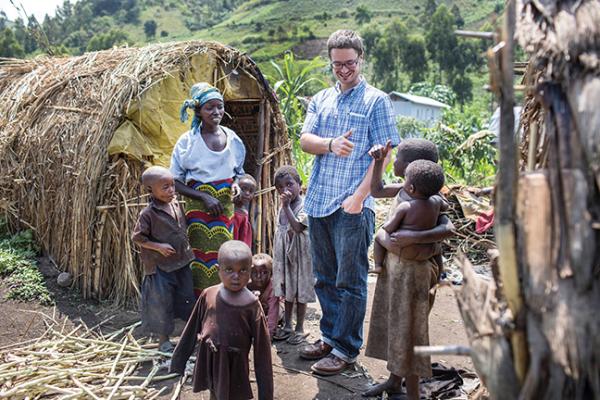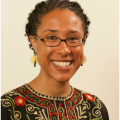MICHAEL J. SHARP was a close friend of mine. In the Democratic Republic of the Congo (DRC), he was a Mennonite witness, scholar, and peacemaker. Over the course of five years, first as a Mennonite Central Committee volunteer and then through the United Nations, Sharp cultivated relationships of trust amid dreadful violence. His work in the DRC included demobilizing armed groups, investigating human rights abuses, and reporting to the U.N. Security Council on “creating the conditions for peace” in the Great Lakes region of Africa.
On March 12, Sharp and colleague Zaida Catalan were killed while on a U.N. fact-finding mission in Congo’s central Kasai region. Earlier, they had documented five mass graves in the region. Over the months, the number had risen to 23. The bodies of Sharp and Catalan were found on March 27. The four Congolese members of their travel team remain missing.
Eastern Mennonite University, where Sharp attended as an undergrad, has an international program for peacemakers, with graduates such as Nobel Peace Prize winner Leymah Gebowee. Many return to their home countries to face political violence, torture, and death.
How do Christian peacemakers engage the loss of friends and colleagues? We train and study as hard for peace as soldiers do for war, yet we do not have to “soldier on” when one of us falls. We do not have to appear “strong for the cause”; there is no national myth that forces us to choke back our tears. Christian Peacemaker Teams, where I serve as executive director, immediately gave me leave to grieve and gather with loved ones. My colleagues and friends sat with our devastation. We did not pretend that the world made sense or that “God has everything under control.”
Mennonites and Anabaptists center Christ’s call to be peacemakers. We recognize the physical, emotional, and spiritual risk involved. The way of peace that Jesus models is filled with turmoil, as seen in his long night weeping in Gethsemane. Giving space to our grief can provide clarity and help with the recovery process. Christ rose from that devastated moment to stay true to his mission—even extending a healing touch to his captor’s ear (Luke 22:51).
The process of grieving is also part of peacemaking. A staggering number of tragedies cross our Facebook feed every day. We become desensitized. We decontextualize. But when someone you know personally suffers and dies, all the pain of all those numbers and situations rushes in. It pounds the body: searing, graphic, unrelenting.
Part of peacemaking is to let that pain in, to be made raw and sensitized by it. By having compassion for ourselves, by asking for help, an even deeper commitment can grow. Our circle of care widens. We open our heart and mind to the reality of the many people and places whose names we don’t know, but whose lives matter just as much as the one we do know.
In Michael Sharp’s case, it is too trite to see him simply as a “martyr for peace.” He and his colleagues were searching for mass graves in the Kasai region and someone did not want them to complete that work. It is up to us to make sure his work continues.
The wider church can honor a peacemaker like Sharp by not by putting him on a pedestal. Instead of distancing ourselves from the pain, let the loss enter us. Aware of our own complexity, we can embrace the complexity of the slain peacemaker’s story. We can honor their work by learning where they served, why, and what local efforts continue. Grieving requires disrupting business as usual and examining how we have been conformed to the patterns of violence in the world. Connecting with grief, rather than “soldiering on,” will reorder our priorities once we are moving again.

Got something to say about what you're reading? We value your feedback!

